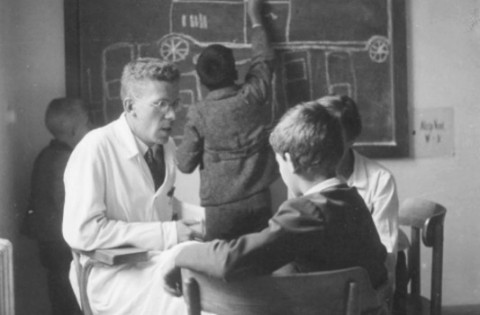
by Julia Boyd
To anyone who thought of Hans Asperger as a brilliant doctor whose pioneering work in child psychiatry led to a more enlightened understanding of autism, Edith Sheffer's book, Asperger's Children (WW Norton), will come as a nasty shock. At first, he seems set to emerge a hero. After all, anyone who could write in Vienna in 1938 that doctors had "the right and the duty" to invest "intensively and emotionally" in autistic children because those "who fall out of the norm and are difficult need experience, love, and full commitment from the educator" must surely have been brave as well as humane. Some months before Asperger wrote those words, which express the kind of liberal medical outlook we associate with our own times, the chairman of the Hereditary Health Supreme Court had asked the head of Hitler's SS, Heinrich Himmler, to send him "a hundred classified homosexuals" for experimental purposes.
But, as Sheffer reveals so remorselessly, alongside the real empathy that Asperger showed to many of his patients – particularly the high-functioning ones – there are also horrifying aspects to his story that have only recently come to light. After his appointment in 1934 as director of the Curative Education Clinic at the University of Vienna Children's Hospital, his work was increasingly sanctioned and shaped by Nazi doctrine.
Where once he had preached the value of bringing different approaches to the treatment of autistic children, according to their particular needs, by 1940 he was making the chilling assertion that the purpose of special education was to "align these children with the National Socialist state".
Soon, he was to have the power of life and death over the children referred to his clinic. Those he judged intelligent – and therefore redeemable – were nurtured and encouraged. Others, whose existence was "unworthy of life", were dispatched either to harsher institutions or, in the worst case, to the child-killing facility at Spiegelgrund. Noted for his intuitive rather than scientific approach to diagnosis, Asperger seems often to have made these judgments on a whim.

Hans Aspberger. Pictorial Press Ltd / Alamy Stock Photo
While he himself took no part in the actual killing, several of the men who did were his close colleagues, for whom he expressed admiration. The chapter on the Spiegelgrund atrocities is not for the faint-hearted. Sheffer, having painstakingly pieced together the children's stories, relates them in shattering detail, sometimes in the words of survivors.
Found wanting
The book is not just about Asperger. Sheffer conducts a masterly survey of the regime's program to rid the Reich of all "undesirable" elements. There was, for instance, the Motorised Mother Advising scheme, with which for a short time Asperger was involved. Ostensibly to dispense medical care to women in rural areas, this worthy-sounding enterprise had a sinister agenda. Accompanying the doctor on his field trips were a welfare worker and a nurse, whose job was to record disabled or genetically "tainted" children, as well as any parents found wanting. As a result, a number of these children ended up in institutions or even Spiegelgrund itself, where the energetic Erwin Jekelius was director.
Sheffer informs us that Jekelius supervised the killing of 100 children there and of 4000 adults at Steinhof – the other euthanasia centre in his charge. Dedicated to his work, Jekelius would trawl children's institutions in search of suitable candidates to remove to Spiegelgrund. Yet this monster, with whom Asperger co-operated, was praised by doctors and patients for his "profoundly kind" bedside manner.
While Sheffer leaves us in no doubt that Asperger has much to answer for, she also makes the point that, like others who survived the Third Reich, he was forced to operate in a world not black and white but grey. His right-wing credentials were established early on – he signed up to the fascist Fatherland Front in 1934, and was a member of various anti-liberal and anti-Semitic organisations – but he never joined the Nazi Party, and never renounced his Catholicism. (One wonders how he managed to square his belief in the sanctity of life with his knowledge of what went on at Spiegelgrund.)
The fact that he was not a party member helped him emerge unscathed from Germany's defeat. He might have died in obscurity, however, had it not been for the British psychiatrist Lorna Wing, who publicised his 1944 post-doctoral thesis as "Asperger's syndrome" in 1981, a year after his death. Contrary to Asperger, Wing believed (in a doctrine now widely accepted) that the intelligent, sometimes very talented children with whom Asperger chose to work were, in fact, on the same spectrum as those with more extreme autism.
Asperger himself was a man of contradictions. As a teenager, he was called "socially awkward, cool and distant", characteristics which, along with his apparent lack of emotional response to Spiegelgrund, makes one wonder whether he did not, at some level, suffer from his own syndrome.
Although at times an almost unbearably grim read, this superbly researched book is an important contribution to our understanding of attitudes to autism, and to our knowledge of one of the very darkest episodes in recent human history.
Julia Boyd's Travellers in the Third Reich is published by Elliott & Thompson.